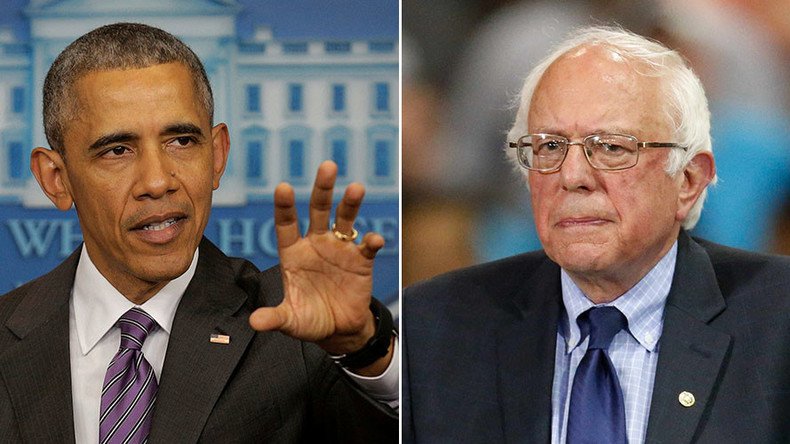Obama tosses some crumbs to Sanders on big banks, says he is ‘correct’ in a ‘sense’

President Obama has yet to endorse anyone to take over his job, but only Bernie Sanders’s name came up during a recent interview. Obama said the democratic socialist presidential candidate was “correct” about one thing, but that didn’t amount to much.
“It is true that we have not dismantled the financial system, and in that sense, Bernie Sanders’s critique is correct,” Obama told The New York Times Magazine in an interview released Thursday.
FishTank: Jane goes to bat for #Bernie, Boehner sees devil in Cruz (#Cruzifer) [VIDEO] https://t.co/IIMi6Vrwvw@LindsayFrance@NewswithEd
— RT America (@RT_America) April 28, 2016
Sanders, a registered Independent US senator for Vermont, earlier this month laid out a plan to “break up the big banks” and has said the Obama administration did not go far enough in regulating Wall Street.
“The economy is not an abstraction,” Obama expounded. “It’s not something that you can just redesign and break up and put back together again without consequences.”
While Sanders is tapping into large swaths of the US electorate who feel the economy is “rigged,” the president remains convinced that much of the mass antipathy is not based on any economic reality, but rather the messaging of some political leaders.
“How people feel about the economy,” Obama said, is at least partly based upon “what they hear,” specifying “the Republicans” as the ones “constantly channeling to their base, which is sizable, say, 40 percent of the population, that things are terrible all the time.”
In the most recent weekly Gallup poll averaging Americans' economic outlook, 60 percent of Americans believed the economy was getting worse, compared to 35 percent who thought it was getting better. It has been more than a year since a majority of Americans expressed optimism in the economy's future, and for most of Obama's second term, the Gallup poll has shown Americans more pessimistic than optimistic. The president, however, is an eternal optimist.
“I actually compare our economic performance to how, historically, countries that have wrenching financial crises perform,” Obama said. “By that measure, we probably managed this better than any large economy on Earth in modern history."
The Commerce Department reported on Thursday that the economy had grown half a percentage point between January and March 2016, which is the weakest uptick in two years.
Obama only mentioned Sanders by name once in the New York Times Magazine interview, but he did allude to the presidential candidate’s policies one more time, sandwiching them between Republican frontrunner Donald Trump’s.
Obama acknowledged that his own recovery efforts enacted since 2009 “to create a more nimble, dynamic economy” did not “yield immediate benefits,” leaving many American workers feeling the stimulus or other government programs were “a distraction or an effort to undermine a bygone era that doesn’t exist.”
“And that then feeds,” Obama continued, “both on the left and the right, a temptation to say, ‘If we could just go back to an era in which our borders were closed,’ or ‘If we could just go back to a time when everybody had a defined-benefit plan,’ or ‘We could just go back to a time when there wasn’t any immigrant that was taking my job, things would be O.K.’”
Obama’s plan to scrap plutonium disposing facility violates int'l deal [VIDEO] https://t.co/C6m9yL1ckG@SimoneReports@Yaro_RT
— RT America (@RT_America) April 28, 2016
Sanders’s plan to “break up large financial institutions” was announced on April 6 by a campaign spokesperson, following a New York Daily News editorial board interview with Sanders that left many doubting his grasp on his own policies.
“Within the first 100 days of his administration,” the press release read, “Sen. Sanders will require the secretary of the Treasury Department to establish a ‘Too-Big-to Fail’ list of commercial banks, shadow banks and insurance companies whose failure would pose a catastrophic risk to the United States economy without a taxpayer bailout.”
“Within a year,” the statement added, “the Sanders administration will work with the Federal Reserve and financial regulators to break these institutions up using the authority of Section 121 of the Dodd-Frank Act.”












